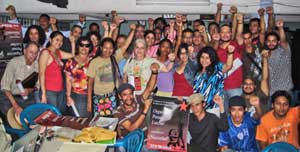Youth resist, organize in Honduras
By
LeiLani Dowell
Published Oct 23, 2009 11:30 PM
Youth and students are an important sector participating in the struggle
against the illegal coup d’etat in Honduras. Video after video of the
resistance actions that have taken place since the July 28 coup have shown youth
in the streets and facing repression as well.
|
U.S. delegation meet with Honduran youth.
WW photo: LeiLani Dowell
|
The U.S. Delegation of Labor, Community and Clergy in Solidarity with the Honduran Resistance was able to meet
with several student organizers on Oct. 9 and 10. However, as a result of the
repression, the delegation was not able to meet with as many youth as expected.
On Oct. 9, two men attempted to kidnap one of the student leaders; while the
young woman was able to escape with a fractured hand, it prevented her
organization from meeting with the U.S. delegation. Instead, they needed to
meet collectively to discuss security measures and tactics.
Digna Rodríguez is a student at the pedagogical university, which has
become the meeting point for many of the daily marches and rallies taking place
in Tegucigalpa. She reported that the entire university has been militarized
and used as a detention center by the police, who torture their detainees on
the campus grounds. The school administration has threatened students with
academic discipline for participating in resistance activities and has denied
permission for activities on campus. Meanwhile, teachers in the resistance have
also faced harassment from the administration.
A member of the U.S. delegation from the youth group FIST—Fight
Imperialism, Stand Together—described the use of massive amounts of tear
gas and long-range acoustic devices in Pittsburgh to attack the mostly young
protesters at the G-20 summit in September. These same weapons have been used
against youth in Honduras.
Ian Díaz, leader of the youth group Los Necios, is a student at the
National University, the largest university in the country with some 70,000
students. Díaz told the delegation that the resistance movement at the
university includes teachers, students and workers. While the university itself
has attempted to hold itself apart from the political situation within
Honduras, resistance members on campus work hard to raise the political
consciousness of those attending and working at the college. He said that with
the extreme violence occurring throughout the country, more students are now
able to relate the political situation in the country to their everyday
lives.
Díaz explained: “Before, people weren’t aware of theory, of
what it meant to belong to a class. Now workers see it very clearly. [President
Manuel] Zelaya took politics that had been neglected for a while and pushed for
change that affected the biggest sector of society—stopping
privatization, raising the minimum wage.
“Over the past three years, people saw that these things were negatively
affecting some, and benefiting others. They realized that there were marked
differences; that the workers benefited while the businesspeople, the owners of
the means of production, were affected adversely. This gave the people their
class consciousness—it’s very noticeable who the coup is for.
There’s no better way to learn something than through action. You can
also see which students are at the marches.”
The two are members of a broader Youth Front against the Military Coup, which
is a part of the larger National Resistance Front against the coup and includes
students as well as youth from the rural, peasant and Indigenous populations of
the country, the majority of whom cannot afford to attend college.
On Oct. 10, the delegation was able to briefly attend a class on revolutionary
studies that is organized and held every Saturday afternoon by Los Necios. A
class of about 30 youth listened raptly and took notes on Marxist theory. Los
Necios (whose name roughly translates to “the troublemakers”)
identifies as a socialist organization, taking its ideology from a combination
of revolutionaries from Marx and Lenin to Trotsky, Mao and others.
When asked what their message to youth in the U.S. and worldwide would be, a
member of Los Necios answered: “Our message would be that youth need to
get involved politically. As young people, we are obliged to get involved.
Being a revolutionary is a moral obligation.”
Dowell represented the youth group FIST on the U.S. delegation. An
interview with her about the delegation’s experiences in Honduras can be
found at www.blogtalkradio.com/FIST-Youth.
Articles copyright 1995-2012 Workers World.
Verbatim copying and distribution of this entire article is permitted in any medium without royalty provided this notice is preserved.
Workers World, 55 W. 17 St., NY, NY 10011
Email:
[email protected]
Subscribe
[email protected]
Support independent news
DONATE


